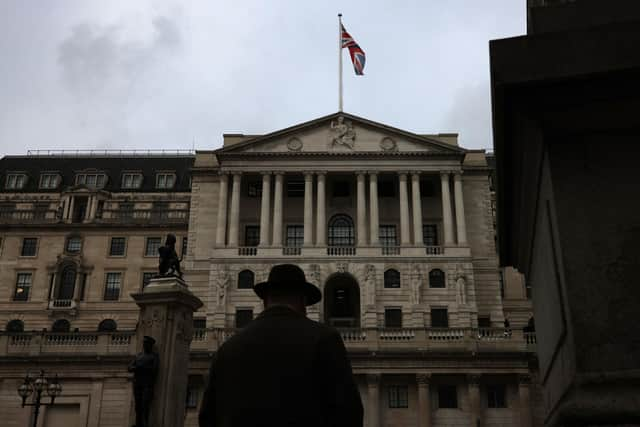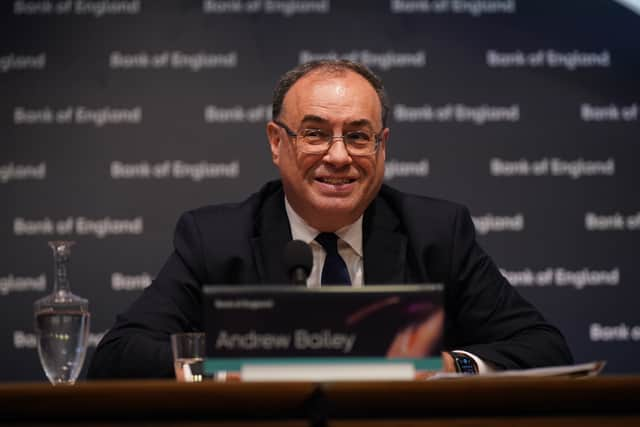Bank of England: what the base interest rate rise is, and what was said about inflation and recession
and live on Freeview channel 276
The Bank of England hiked interest rates in the biggest single rise since 1995, and warned that inflation will peak at more than 13% as gas prices soar.
It also said the UK will fall into it longest recession since the financial crisis.
Advertisement
Hide AdAdvertisement
Hide AdSince announcing the rise the Bank has faced critisim it was too slow in acting against rising inflation.
The stark outlook means household incomes are predicted to drop for two years in a row, and further interest rises could be on the cards relatively soon. Here’s what you need to know about the increases and what it means.


What is the interest rate rise?
Decision makers increased the Bank’s base interest rate to 1.75% from 1.25%, as they tried to control the runaway inflation.
Consumer Prices Index inflation will hit 13.3% in October, the highest for more than 42 years, if regulator Ofgem hikes the price cap on energy bills to around £3,450, the Bank’s forecasters said.
Advertisement
Hide AdAdvertisement
Hide AdThe energy price will push the economy into a five-quarter recession – with gross domestic product (GDP) shrinking each quarter in 2023.
“Growth thereafter is very weak by historical standards,” the Bank said on Thursday.
What does it mean for household incomes?
The dire economic conditions will see real household incomes drop for two years in a row, the first time this has happened since records began in the 1960s. They will drop by 1.5% this year and 2.25% next.
However, the recession will at least be shallower than the 2008 crash, with GDP dropping up to 2.1% from its highest point.
Advertisement
Hide AdAdvertisement
Hide AdBank officials said that the depth of the drop is more comparable to the recession in the early 1990s.
Unemployment will start to rise again next year, according to the projections.
The Bank said that it expects inflation to come back under control in 2023, dropping below 2% towards the end of the year.
“The United Kingdom is now projected to enter recession from the fourth quarter of this year,” the Bank’s Monetary Policy Committee (MPC) said.
Advertisement
Hide AdAdvertisement
Hide Ad“Real household post-tax income is projected to fall sharply in 2022 and 2023, while consumption growth turns negative.”
GDP is set to grow by 3.5% this year, the Bank said, revising its previous 3.75% projection downwards. It will then contract 1.5% next year, and a further 0.25% in 2024.


Meanwhile, real post-tax household income will fall 1.5% this year and 2.25% next, it said.
All but one member of the MPC, which sets interest rates, voted for the base rate to rise by 0.5 percentage points to 1.75%.
It puts rates at their highest point since January 2009.
Advertisement
Hide AdAdvertisement
Hide AdThe MPC said that pressures from inflation had intensified since the last time the committee met, largely due to a near doubling in wholesale gas price since May.
What was said about energy prices?
As this feeds through to energy prices, households will face a major squeeze on their budgets.
The Bank forecast that the price cap on energy bills will rise from £1,971 to £3,450 per year for the average household this October.
Experts from Cornwall Insight, an energy consultancy, have also predicted further hikes, to £3,616 in January and £3,729 in April. Other energy experts believe it could go higher still.
Advertisement
Hide AdAdvertisement
Hide AdBank of England governor Andrew Bailey highlighted the impact of soaring energy costs on the wider economic picture.
At a press conference he said the “further sharp increase in energy prices” had been the biggest development in recent months.
“Wholesale gas futures prices for the end of this year… have nearly doubled since May,” he said.
They are “almost seven times higher” than forecasts had suggested a year ago, he added.
Advertisement
Hide AdAdvertisement
Hide Ad“That’s overwhelmingly a consequence of Russia’s restriction of gas supplies to Europe and the risk of further cuts.”
What has the Government said?
Chancellor Nadhim Zahawi said: “Along with many other countries the UK is facing global economic challenges and I know that these forecasts will be concerning for many people.
“Addressing the cost of living is a top priority and we have been taking action to support people through these tough times with our £37 billion package of help for households, which includes direct payments of £1,200 to the most vulnerable families and a £400 discount on energy bills for everyone.
“We are also taking important steps to get inflation under control through strong, independent monetary policy, responsible tax and spending decisions, and reforms to boost our productivity and growth.
Advertisement
Hide AdAdvertisement
Hide Ad“The economy recovered strongly from the pandemic, with the fastest growth in the G7 last year, and I’m confident that the action we are taking means we can also overcome these global challenges.”
Will rates go up again soon?
The Bank of England may be forced to increase rates by another half point as soon as next month as it puts the need to rein in inflation over risks of deepening the looming recession, economists have warned.
James Smith, developed markets economist at ING, said it is a “strong possibility” that rates may rise again, to 2.25% next month, even though the Bank is forecasting a 15-month recession from the fourth quarter.
Bank Governor Andrew Bailey said “all options” are on the table for next month, though he sought to stress that “policy is not on a pre-set path, and what we do this time does not tell you what we’re going to do next time”.
Advertisement
Hide AdAdvertisement
Hide AdBut Mr Smith said: “The fact that the Bank reiterated its willingness to act ‘forcefully’ to curb inflation, we think there’s a strong possibility of another 50bp (basis point) hike in September – particularly if that’s what both the Fed and European Central Bank end up doing too.”
He went on: “The fact that the Bank is stepping up the pace of rate hikes while also forecasting a meaningful recession shows just how worried it is that worker shortages and supply issues could keep inflation elevated even as the economy weakens.”
But it is thought the Bank may look to pause after one or more hikes, with ING believing rates may peak at 2.25% to 2.5% later this year.
Has the Bank faced criticism?
Yes, politicians, including Attorney General Suella Braverman, had said the Bank had been too slow to act in raising interest rates.
Advertisement
Hide AdAdvertisement
Hide AdHowever, Andrew Bailey told BBC Radio 4’s Today programme said he does not believe the Bank acted too slowly and that earlier action could have brought forward a recession.
“We don’t make policy with the benefit of hindsight,” he added.
“I’d challenge anyone sitting here a year, two years ago, to say there will be war on Ukraine and it will have this effect on inflation.”
Comment Guidelines
National World encourages reader discussion on our stories. User feedback, insights and back-and-forth exchanges add a rich layer of context to reporting. Please review our Community Guidelines before commenting.
